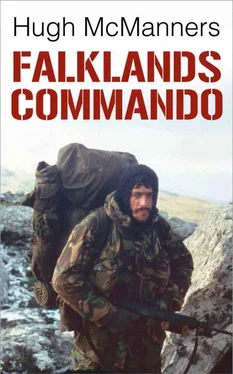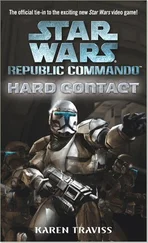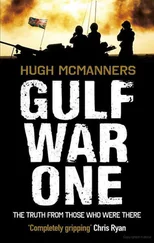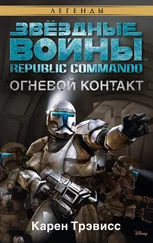Hugh McManners - Falklands Commando
Здесь есть возможность читать онлайн «Hugh McManners - Falklands Commando» весь текст электронной книги совершенно бесплатно (целиком полную версию без сокращений). В некоторых случаях можно слушать аудио, скачать через торрент в формате fb2 и присутствует краткое содержание. Город: London, Год выпуска: 2014, ISBN: 2014, Издательство: Nightstrike Publishing, Жанр: nonf_military, Биографии и Мемуары, на английском языке. Описание произведения, (предисловие) а так же отзывы посетителей доступны на портале библиотеки ЛибКат.
- Название:Falklands Commando
- Автор:
- Издательство:Nightstrike Publishing
- Жанр:
- Год:2014
- Город:London
- ISBN:978-0-992-81540-0
- Рейтинг книги:4 / 5. Голосов: 1
-
Избранное:Добавить в избранное
- Отзывы:
-
Ваша оценка:
- 80
- 1
- 2
- 3
- 4
- 5
Falklands Commando: краткое содержание, описание и аннотация
Предлагаем к чтению аннотацию, описание, краткое содержание или предисловие (зависит от того, что написал сам автор книги «Falklands Commando»). Если вы не нашли необходимую информацию о книге — напишите в комментариях, мы постараемся отыскать её.
Falklands Commando — читать онлайн бесплатно полную книгу (весь текст) целиком
Ниже представлен текст книги, разбитый по страницам. Система сохранения места последней прочитанной страницы, позволяет с удобством читать онлайн бесплатно книгу «Falklands Commando», без необходимости каждый раз заново искать на чём Вы остановились. Поставьте закладку, и сможете в любой момент перейти на страницу, на которой закончили чтение.
Интервал:
Закладка:
But this being peacetime, and most people in the Armed Forces having no actual ‘killing people with guns’ combat experience, the intolerance of ‘stiff upper lip’ affects policy, treatment and the lives of serving combat veterans. The MoD’s senior psychiatrist told me that even in the Royal Army Medical Corps, one half ‘got it’, and the other half did not. The psychological problems created by war are hardly an indication of weakness or defective character. On the contrary, all these stress-related symptoms are a normal, sane response to its horrors.
Wars however, are not all horror. On the battlefield many find humour, comradeship, self-sacrifice, human dignity and even love, a richness of life that can make peacetime seem selfish, mean and rather squalid. War affects people in different ways: in the extremes, some become clinically mad, while others live perfectly happy, normal lives. It is true to say, however, that everyone is to some extent affected. Only a psychopath could claim otherwise. Most war veterans are made stronger by their experiences, seeing life through new and more grateful eyes. Some slip in and out of various forms of depression – like everybody else.
However, unlike most people, war vets are very tough and know how to endure pain.
2014 Note:
The publication of The Scars of War in 1992 was accompanied by howls of disapproval from a certain type of military officer and from the MoD. The then director of Army PR was told ‘this book is going to cause us a lot of trouble’. They saw the book’s often-graphic veracity as being so revealing as to constitute a threat to the Armed Forces’ ability to fight future wars.
However it was clear to the war veterans who read the book, that this was the authentic voice of real professional soldiers describing a reality that civilians, politicians, MoD officials – and that certain type of military officer, do not know; and it would seem, cannot understand. As veterans and non-myopic military officers read the book, I was soon being invited to give lectures to serving military audiences, with The Scars of War appearing on prescribed military and university War Studies reading lists – including at The Army Staff College Camberley.
Then some seven years later, this emerging realisation of the problems led to the High Court case ‘Veterans vs MoD’ in which The Scars of War was used as the basis of a class action against the MoD. The grounds were that the MoD had not provided appropriate care for veterans with PTSD and other combat-related psychological conditions.
Sadly this class action failed, which left these problems just as painful and debilitating for veterans as they’d ever been. But actually, I realised, things were made worse. Veterans’ problems had been officially denied by the Establishment, which had been supported by the Courts. The MoD had prevailed, and as I discovered, could now stick to its myopic perspective of this being a potential liability to the MoD – and an ‘unnecessary’ expense. Given the hundreds of millions the MoD wastes as a matter of course, their unpleasant and immoral refusal to help veterans sickened me.
At first I was so deeply disillusioned that I walked away from the whole problem. I felt I’d done my bit, had failed, and that somebody else would do a better job. But nothing was done…
So I spent seven years of trying to work out how this issue could somehow be made important enough to get better help for the many affected serving and retired war veterans. I decided that scientific research was the way ahead; to bring the authorities who could relive their suffering, onto a grid of proven and incontrovertible fact.
And so then, in 2009, I met Oxford and Aarhus Universities’ Professor Morten Kringelbach, a pioneering neuroscientist specialising in understanding the role and function of the brain’s prefrontal cortex. His expertise, and intense personal interest, were in those aspects of the brain that cause the symptoms I had been studying and documenting for the previous decade.
And so in 2011, The Scars of War Foundation was formed as part of Oxford University’s Psychiatric Department, based at The Queen’s College where many history-changing scientific discoveries have been made: including the synthesis of penicillin, and the antibiotics that were to save millions of military lives.
In 2012, The Scars of War Foundation began a neuroimaging study comparing brain function in veterans with PTSD, to veterans with similar military experience with no symptoms.
Our current ‘chronic PTSD’ project, and a new ‘before and after’ longitudinal study (to be carried out subject to MoD permission) will show us what PTSD is, how bangs on the head and explosions might contribute to veteran’s psychological problems, and how these problems begin and develop. From this, we will aim to determine ways to achieve early and accurate diagnosis of these problems, and effective treatment.
The long-term aim is to reduce the numbers of military people ending up as long-term, chronically-affected victims. Apart from dramatically cutting the cost of care to military charities, this will hugely reduce the burden of pain suffered by so many of our war veterans.
The Scars of War: CHAPTER 1 – FIGHTING THE PEACE
The psychologist Norman F. Dixon quotes a scathing description of the militarist, whose characteristics he ascribes to all soldiers:
“The militarist is a relatively prejudiced and authoritarian person. He is emotionally dependent, socially conformist and religiously orthodox. His interest in the welfare of others is relatively low. He is extremely distrustful of the new and strange.’ Such people are also ‘uncreative, unimaginative, narrow-minded, security-seeking, prestige-orientated, parochial, ultra-masculine, anti-intellectual, extroversive [extrovert], and severely socialised as children’. They are lacking in aesthetic appreciation, complexity of thinking, independence, self-expression and altruism, and relatively high in anxiety. Finally, military professionals are lower in self-esteem than any other occupational group.” [16]
If all soldiers fitted this description, then an army would at least consist of like-minded people; but every person is different, and armies are manned by human beings and not Dixon’s caricatures. Some might be as Dixon describes, but may not show it. Some might be partly ‘militarist’ but with other characteristics, while others are not militarist at all. In other words, Dixon’s generalisation is just that, and useful only as a yardstick against which to compare real military people.
Nevertheless, there is an ‘official’ military attitude or outlook, but this is very different to Dixon’s cartoon ‘militarist’. Rather, there is a sort of common denominator that everybody in a military organisation understands – and will ultimately defer to.
When young men enquire about joining the armed forces, the recruiters do not include quotations like Dixon’s in the pamphlets they hand out. Instead they emphasise aspects of military life that would be attractive to their target audience – like prestige, masculinity, ‘extrovert-ism’ and security, while making virtues of conformism, discipline, authoritarianism and anti-intellectualism. Recruits either accept the recruiters’ picture, which is strongly confirmed throughout basic training, or they find military life intolerable and leave.
Military selection and training sets great store on the moulding of individuals into membership of the military team. Fitting-in is paramount.
Conformism is possibly the most important personal characteristic, particularly for officers. Armies tend to get rid of misfits and only tolerate odd-ball characters if (paradoxically) they happen to fit in; because they have something to offer like sporting prowess, an amusing and acceptable eccentricity, or they can be adopted as mascots. The stress of peacetime life in the armed forces is in many ways related to this constant pressure to conform. Peace is so different to war that to survive the peace, armies have to change, often radically, in character. Excellent soldiers can become frustrated in peacetime and so ‘misbehave’ according to the peacetime ethos. The peacetime military hierarchy will not tolerate their antics even though it accepts the worth of such men in war.
Читать дальшеИнтервал:
Закладка:
Похожие книги на «Falklands Commando»
Представляем Вашему вниманию похожие книги на «Falklands Commando» списком для выбора. Мы отобрали схожую по названию и смыслу литературу в надежде предоставить читателям больше вариантов отыскать новые, интересные, ещё непрочитанные произведения.
Обсуждение, отзывы о книге «Falklands Commando» и просто собственные мнения читателей. Оставьте ваши комментарии, напишите, что Вы думаете о произведении, его смысле или главных героях. Укажите что конкретно понравилось, а что нет, и почему Вы так считаете.












